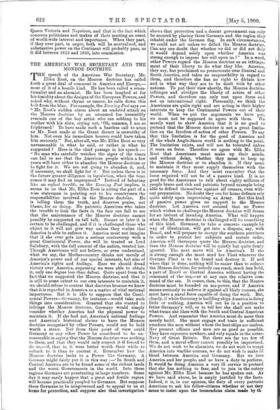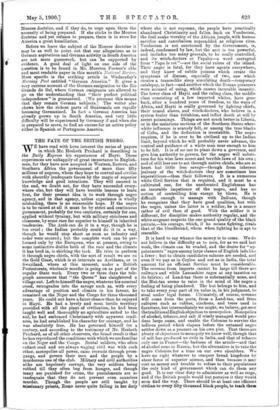THE AMERICAN WAR SECRETARY AND THE MONROE DOCTRINE. T HE speech
of the American War Secretary, Mr. Elihu Root, on the Monroe doctrine has called forth a great deal of comment in America and Europe,— most of it of a hostile kind. He has been called a sensa- tionalist and an alarmist. He has been laughed at for his timidity about the designs of the European Powers, and asked why, without rhyme or reason, he calls down this bolt from the blue. For example, the Evening Post says :— "Mr. Root's sudden alarm about an undated attack on the Monroe doctrine by an unnamed foe irresistibly reminds one of the boy artist who ran sobbing to his mother with his slate, crying out, 'Oh, mamma, I am so frightened.' To have made such a baseless call to arms as Mr. Root made at the Grant dinner is unworthy of him. Not even his immediate hearers could have taken him seriously." But, after all, was Mr. Elihu Root so very unreasonable in what he said, or rather in what he suggested ? Here is the chief passage in his speech :— "No man who carefully watches the signs of the times can fail to see that the American people within a few years will have either to abandon the Monroe doctrine or to fight for it. We are not going to abandon it, and, if necessary, we shall fight for it. But unless there is in the future greater diligence in legislation, when the time comes it may find us unprepared." Instead of behaving like an enfant terrible, as the Evening Post implies, it seems to us that Mr. Elihu Root is acting the part of a wise statesman in pointing out to his countrymen the responsibilities involved in the Monroe doctrine. He is telling them the truth, and deserves praise, not blame, for so doing. No patriotic American who takes the trouble to look the facts in the face can fail to see that the maintenance of the Monroe doctrine cannot possibly be supported on tall talk. Sooner or later it is certain to be challenged, and if it is challenged those who object to it will not give way unless they realise that America is able to enforce it. America must not imagine that if she ever gets into a serious controversy with a great Continental Power, she will be treated as Lord Salisbury, with the full consent of the nation, treated her. Though Americans will not believe, or even understand, what we say, the Mother-country thinks not merely of America's power and of our special interests, but also of America's rights and feelings. Here we should dread victory over America, supposing we were able to obtain it, only one degree less than defeat. Quite apart from the fact that we suggested the Monroe doctrine, and that it is still to some extent to our own interests to maintain it, we should refuse to contest that doctrine because we know that it is regarded in America as a matter of vital national importance. But it is idle to suppose that the Conti- nental Powers—Germany, for instance—would take such things into consideration. Granted that she wanted to infringe the Monroe doctrine, Germany would simply consider whether America had the physical power to maintain it. If she had not. America's national feelings • and America's historical claims to have the Monroe doctrine recognised by other Powers, would not be held worth a straw. Nor from their point of view could Germany or any other Power be considered to be un- reasonable in saying that the Monroe doctrine was nothing to them, and that they would only respect it if forced to do so,—if, that is, it were better worth their while to submit to it than to contest it. Remember how the Monroe doctrine looks to a Power like Germany. A German might fairly put it in this way :—' In South and Central America are to be found some of the richest lands and the worst Governments in the world. Into these regions Germans are penetrating in large numbers. Some day it may easily happen that a great and fertile region will become practically peopled by Germans. But suppose these Germans to be misgoverned and to appeal to us at home for protection, and suppose also that investigation shows that protection and a decent government can only be secured by placing these Germans and the region they inhabit under the German flag. In such circumstances, we could not act unless we defied the Monroe doctrine. Can any one doubt that whether we did or did not defy it would depend solely upon whether America was strong enough to impose her will upon us ? ' In a word, other Powers regard the Monroe doctrine as an infringe. ment of their liberty to do what they like. America, they say, has proclaimed no protectorate over Central and South America, and takes no responsibility in regard to them, and therefore she has no right to dictate how and in what way they are to be dealt with by other nations. To put their view shortly, the Monroe doctrine infringes and abridges the liberty of action of other Powers, and therefore can only rest upon force and not on international right. Personally, we think the Americans are quite right and are acting in their higher interests to keep the Continental Powers out of their world. When we put the arguments we have put, we must not be supposed to agree with them. We merely want to show America that it is no good to pretend that the Monroe doctrine is not a great limita- tion on the freedom of action of other Powers. To say that this limitation is for the good of America and of the whole Anglo-Saxon world is nothing to the point. The limitation exists, and will not be tolerated unless it rests on force. Therefore we agree with Mr. Elihu Root that Americans must make up their minds, and without delay, whether they mean to keep up the Monroe doctrine or to abandon it. If they mean to maintain it they must supply themselves with the necessary force. And they must remember that the force required will not be of a passive kind. It is no good for the Americans to talk about eighty millions of people brave and rich and patriotic beyond example being able to defend themselves against all comers, even with- out preparation. No doubt they can for home defence rely quite safely upon improvising an Army. But this kind of passive power gives no support to the Monroe doctrine. Let America rest assured that no Power which wishes to challenge the Monroe doctrine will dream for an instant of invading America. What will happen when the Monroe doctrine is challenged will be something of this kind. Germany, to take a concrete example by way of illustration, will get into a dispute, say, with Brazil, and will prepare to occupy the southern provinces in order to protect her subjects and restore order. America will thereupon quote the Monroe doctrine, and then the Monroe doctrine will be quietly but quite firmly ignored. The next move will be America's. If she is strong enough she must send her Fleet wherever the German Fleet is to be found and destroy it. If and when that is done, nothing will be easier than to enforce the Monroe doctrine, for nobody can reach, much less hold, a part of Brazil or Central America without having the command of the sea,—or at any rate the relative com- mand of the sea. It comes, then, to this, that the Monroe doctrine must be founded on sea-power, and if America means seriously to enforce it against all likely corners, she must have a naval force capable of doing the work. But, clearly, if while Germany is building ships America is doing little or nothing, America will not be in a position to fetter Germany's will, or to tell her she shall not make what terms she likes with the South and Central American Powers. And remember that America must do more than merely build. She must engage and train in sufficient numbers the men without whom the best ships are useless. Her present officers and men are as good as possible. They have superiors nowhere, and only equals in the sister. Navy of Great Britain. But there are far too few of them, and a naval officer cannot possibly be improvised. We do not wish to be alarmists, we do not wish to tempt America into warlike courses, we do not wish to make ill blood between America and Germany. But we love America and her people, and so have a duty to perform. It would be doing America a very ill service to pretend that she has nothing to fear, and to join in the outcry against Mr. Elihu Root because he has spoken out. As we have said above, he is amply justified by the facts. Indeed, it is, in our opinion, the duty of every patriotic American to ask his fellow-citizens whether or not they mean to insist upon the tremendous claim made by th Monroe doctrine, and if they do, to urge upon them the necessity of being prepared. If she sticks to the Monroe doctrine and yet refuses to prepare, there is in store for America a great humiliation.
Before we leave the subject of the Monroe doctrine it may be as well to point out that our allegations as to German aspirations and German activity in South America are not mere guesswork, but can be supported by evidence. A good deal of light on one side of the question is to be found in Mr. Moreton Frewen's able and most readable paper in this month's National Review. More specific is the striking article in Wednesday's gorning Post entitled "German America." It gives a very curious account of the German emigration to the Rio Grande do Sul, where German emigrants are allowed to go on the understanding that "their perfect political independence" is guaranteed. [We presume this means that they remain German subjects.] The writer also shows how the richest parts of Guatemala are rapidly becoming Germanised. In fact a German America has already grown up in South America, and very little difficulty will be experienced by Germany if and when she is prepared to move, to find an excuse for an active policy either in Spanish or Portuguese America.







































 Previous page
Previous page